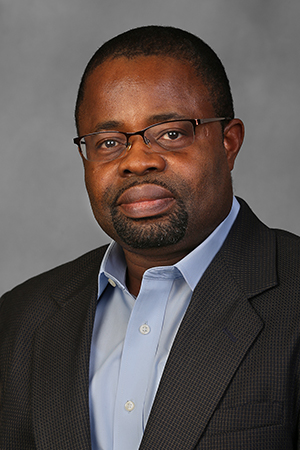Apollos Nwauwa receives Carnegie African Diaspora Fellowship
 Dr. Apollos O. Nwauwa will help develop graduate curriculum for master's and doctoral programs in historical studies at a university in Ghana through the Carnegie African Diaspora Fellowship Program.
Dr. Apollos O. Nwauwa will help develop graduate curriculum for master's and doctoral programs in historical studies at a university in Ghana through the Carnegie African Diaspora Fellowship Program.
Nwauwa, a history faculty member who has also served as director of the Africana Studies program, was one of 70 African Diaspora scholars awarded fellowships to travel to Africa to conduct a wide range of projects across disciplines. He will go to Ghana next summer to work with Kwame Nkrumah University of Science and Technology (KNUST) and Dr. George Bob-Milliar, chair of the KNUST history and political science department.
The department, eager to launch its graduate program soon, will look to Nwauwa for assistance in building a quality program. His extensive international experience in teaching, research and graduate supervision will provide leadership and ideas to organize faculty focus groups and seminars to brainstorm suitable graduate curriculum for the university.
Working with Bob-Milliar and other KNUST colleagues, Nwauwa will facilitate recommendations about access to valuable online instructional and research resources and provide guidance to ensure that the graduate program is attuned to the disciplinary practices in the global context.The immediate outcomes will be a complete draft of a new, suitable graduate curriculum in historical studies at KNUST that is aligned to the standard practices in the field.
Born and educated in Nigeria, Nwauwa has a history of helping his homeland, Uburuekwe, his Igbo ethnic group and Nigeria in general. He serves as Secretary-General of Nigerians in the Diaspora Organization, Americas (NIDOA), and he has served as president of regional Igbo associations in the United States. Last fall he helped to coordinate a mission in which doctors and nurses provided care to about 1,000 people in Uburuekwe.
At BGSU, his teaching and research focus on modern Africa, especially colonial, post-colonial, intellectual and diaspora history. He completed coursework at Dalhousie University in Halifax, Nova Scotia, Canada. He taught at Rhode Island College and Brown University before joining the BGSU Department of History in 2000.
The Carnegie fellowship, in its fourth year, is mutually beneficial to KNUST and BGSU; it provides an opportunity for Nwauwa to give back to his African homeland, turning brain drain into brain gain. The exchange of ideas between Nwauwa and his African colleagues at KNUST will enrich further his own personal experiences with the continent, which will benefit his scholarship and teaching. BGSU gains from the fellowship program through Nwauwa's added experiences with Africa, African scholars and African conditions.
Nwauwa's proposed work with KNUST is similar to the work done by BGSU geography professor Dr. Kefa Otiso, who was among the inaugural Carnegie African Diaspora Fellows. In 2014 Otiso was one of 33 African diaspora scholars in the U.S. and Canada chosen to assist 24 higher education institutions in Africa on projects in curriculum development, research, training and mentoring, and graduate teaching. He worked with Kisii University in southwest Kenya to strengthen the geography department’s existing curriculum and to develop curricula for master’s and Ph.D. programs in geography.
Since the inaugural year, the Carnegie African Diaspora Fellowship Program has helped 239 African-born scholars who have been living and working in North America to connect with their peers at universities throughout Africa. The program is designed to build capacity at the host institutions in Africa, and to develop long-term, mutually beneficial partnerships between the universities. The fellowships are funded by Carnegie Corp. of New York and managed by the Institute of International Education. The United States International University-Africa in Kenya provides strategic direction through Dr. Paul Tiyambe Zeleza and an Advisory Council he chairs. The program selects projects that were proposed by the host universities and matches them with African-born scholars, covering the visiting scholars’ expenses, including transportation, a daily stipend, and the cost of obtaining visas and health insurance.
Updated: 12/02/2017 12:38AM
